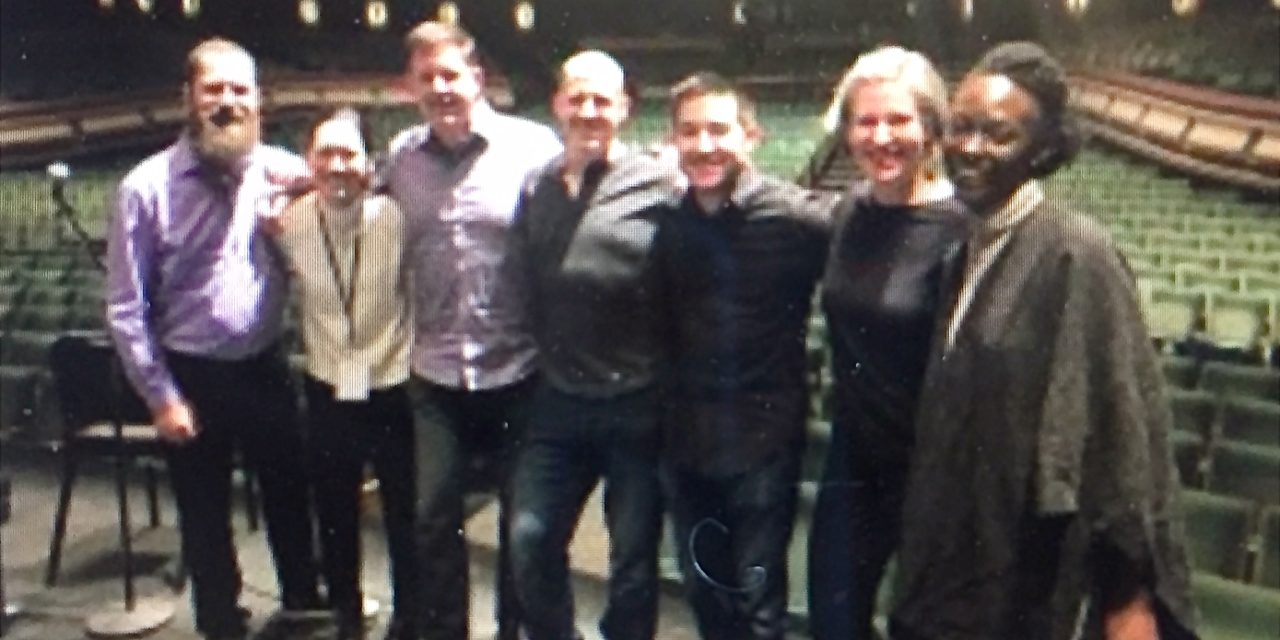(Above: Members of Eighth Blackbird onstage at the Hult Center for the Performing Arts, where the sextet performed on Nov. 15 as guest artists with the Eugene Symphony)
By Daniel Buckwalter
(aka #commonmanatthesymphony)
Thursday night’s concert at the Silva Concert Hall began with Francesco Lecce-Chong, music director and conductor of the Eugene Symphony Orchestra, seated at the harpsichord and leading nine other musicians from the orchestra in Johann Sebastian Bach’s Brandenburg Concerto No. 3.
It is the Baroque music I am most familiar with. It’s often the surround sound in my home. I know enough of this genre to almost venture into a conversation about it.
I enjoy its lightness. It’s almost dance-like.
And it was the perfect set-up, I think, for the real reason a capacity crowd showed up at the Hult Center: to see the Chicago-based ensemble, Eighth Blackbird.
The group did not disappoint.
The six-piece ensemble, which performs only contemporary music, played Jennifer Higdon’s On a Wire with a whimsical, dancing flair. This included three instances when the group surrounded the piano and poked their heads inside it to pull, tug and strum the wires.
At first I wondered if the group was gathering for a meditative moment around the piano, especially at the outset. In a sense, it was. I never knew the innermost parts of a piano could sound melodic on their own.
“I’m going to have to try that on my piano,” the woman seated next to me remarked.
I’d suggest that this might be best left to the professionals, and that would be the award-winning Eighth Blackbird. Pianist Lisa Kaplan and flutist Nathalie Joachim, in particular, stood out, but the group as a whole was endearing.
Thursday night’s concert concluded a whirlwind week in which Eighth Blackbird toured Lane County schools, held workshops, played a children’s concert in the Hult Center’s Silva Hall, and performed at the Slocum Center for Orthopedics & Sports Medicine. I hope the group comes back to Eugene in the near future.
I also wish it well in its mission statement: moving music forward through innovative performance; advocating for new music by living composers; and creating a legacy of guiding an emerging generation of musicians.
For classical music to grow, powerful groups like Eighth Blackbird must have the wind at their backs.
All music was once new, of course, and after intermission came Wolfgang Amadeus Mozart’s Six German Dances. Thankfully, Lecce-Chong explained at the outset the playful, quirky nature of the six dances the orchestra was about to play, and how Mozart threw seemingly senseless phrases into each piece, twists that only he and his contemporaries would understand.
Like me, the audience caught on quickly. Somehow, we were part of an inside joke that no one fully understood, and that was fine. There was laughter throughout when the awkward phrases showed themselves.
Leonard Bernstein’s Fancy Free ended the night of dances. It also concluded the symphony’s three-concert salute to the iconic American maestro, and the seven sprightly dances were a good send-off. Like the six German dances from Mozart, Bernstein’s Fancy Free also contained some quirky surprises. The audience enjoyed it and played along with the music.
The symphony’s ongoing salute to Bernstein was not overdone, I think, but I was ready to see it end. Three parts of three symphony nights spanning three months (and absorbing all of Bernstein’s powerful dynamics in the process) seemed to be ideal.
Now we move on to Dec. 1 with the Eugene Symphony Orchestra’s salute to Star Wars (a joke by its creator George Lucas, because Episode IV: A New Hope actually was the first in the Star Wars series) at Silva Concert Hall, with the orchestra playing the musical part of the soundtrack while the movie shows on a giant screen. The concert begins at 7 p.m.












